高考英语一轮备考语法练习7之动词时态和语态
- 格式:doc
- 大小:623.00 KB
- 文档页数:8

(7)现在完成时及被动语态—2023届高考英语一轮复习语法总动员之动词时态语态一、填空题1.This is the first time that I _____________(visit) the Great Wall.2.The number of overseas students studying at UK universities ______(rise) to 330,000—one in seven of the total by now.3.The number of road accidents ______(increase) over the past year.4.It is the third time that he ______(visit) our beautiful city Harbin.5.China ______(welcome) Western fashion and futuristic technology during the last decades.6.It's too late! The radio says the city _____(flood) already.7.By the end of last year, another new gymnasium ________________(complete) in Beijing.8.Animal products like pearls and silk _____(serve) as decoration for many years.9.In the last few years thousands of films _________(produce) all over the world.10.It's the first time that the computer _____(check) since I bought it.二、阅读下面短文,在空白处填入1个适当的单词或括号内单词的正确形式。
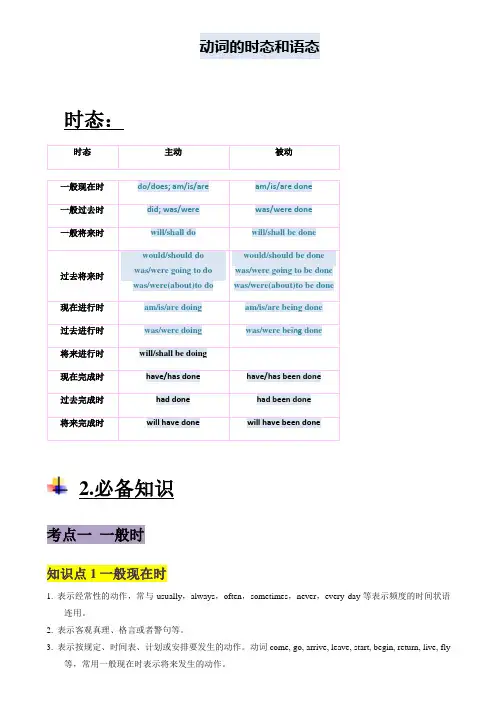
动词的时态和语态时态:时态主动被动一般现在时do/does; am/is/are am/is/are done一般过去时did; was/were was/were done 一般将来时will/shall do will/shall be done过去将来时would/should dowas/were going to dowas/were(about)to dowould/should be donewas/were going to be donewas/were(about)to be done现在进行时am/is/are doing am/is/are being done过去进行时was/were doing was/were be ing done将来进行时will/shall be doing现在完成时have/has done have/has been done过去完成时had done had been done将来完成时will have done will have been done2.必备知识考点一一般时知识点1一般现在时1.表示经常性的动作,常与usually,always,often,sometimes,never,every day等表示频度的时间状语连用。
2.表示客观真理、格言或者警句等。
3.表示按规定、时间表、计划或安排要发生的动作。
动词come, go, arrive, leave, start, begin, return, live, fly等,常用一般现在时表示将来发生的动作。
4.在时间、条件等状语从句中常用一般现在时代替一般将来时。
5.以here/there开头引导的倒装句,表示正在发生的动作/状态6.用于文章标题、图片说明、电影说明、戏剧内容及场景解说等。
知识点2一般过去时1. 表示在过去发生的一次性动作或习惯性动作或存在的状态,常用yesterday,last year,in 1995,the other day等作时间状语。
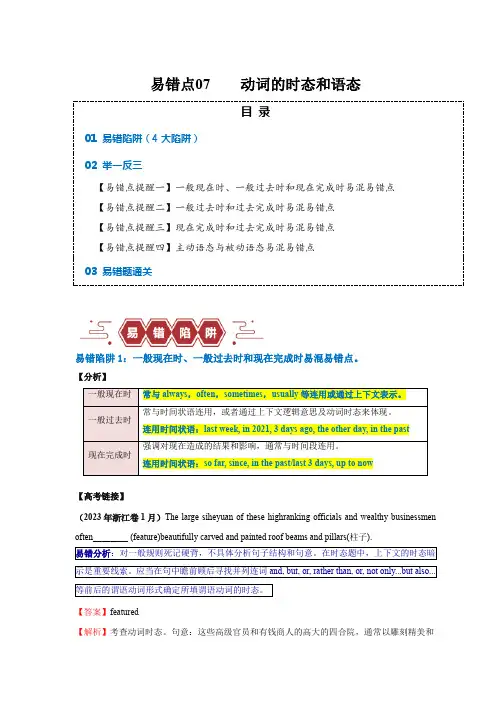
易错点07 动词的时态和语态目录01 易错陷阱(4大陷阱)02 举一反三【易错点提醒一】一般现在时、一般过去时和现在完成时易混易错点【易错点提醒二】一般过去时和过去完成时易混易错点【易错点提醒三】现在完成时和过去完成时易混易错点【易错点提醒四】主动语态与被动语态易混易错点03 易错题通关易错陷阱1:一般现在时、一般过去时和现在完成时易混易错点。
【分析】【高考链接】(2023年浙江卷1月)The large siheyuan of these highranking officials and wealthy businessmen often________ (feature)beautifully carved and painted roof beams and pillars(柱子).【答案】featured【解析】考查动词时态。
句意:这些高级官员和有钱商人的高大的四合院,通常以雕刻精美和被粉刷的房顶横梁和柱子为特点。
分析句子结构可知,空格处需要填谓语动词,再结合and后动词时态可知,空格处应用一般过去时。
故填featured。
易错陷阱2:一般过去时和过去完成时易混易错点。
【分析】1.下列动词hope、wish、expect、think、intend、mean、suppose等,用过去完成时表示“原本……(事实上未能……)”。
2.This/It/That was the first/second/third ... time that ...表示“这/那是(某人)第几次做某事”,that从句中要用过去完成时。
3.hardly ... when ...和no sooner ... than ...两个句型中,主句均用过去完成时。
易错陷阱3:现在完成时和过去完成时易混易错点。
【分析】易错陷阱4:主动语态和被动语态易混易错点。
【分析】➢受母语干扰,翻译上下文时混淆被动语态与主动语态。
➢混淆谓语动词被动语态构词be+done与非谓语动词重点过去分词done。
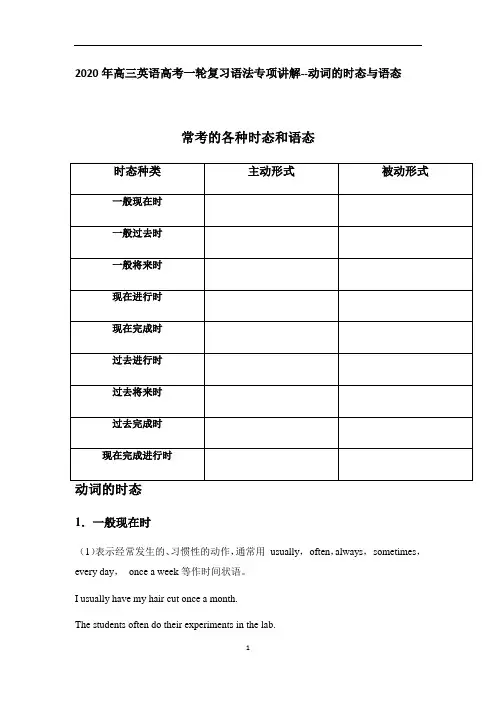
2020年高三英语高考一轮复习语法专项讲解--动词的时态与语态常考的各种时态和语态1.一般现在时(1)表示经常发生的、习惯性的动作,通常用usually,often,always,sometimes,every day,once a week等作时间状语。
I usually have my hair cut once a month.The students often do their experiments in the lab.(2)表示客观真理、格言以及不受时间限制的客观存在。
The earth moves around the sun.A bird in hand is worth two in the bush.(3)表示按时间表、计划、规定发生的动作。
The train leaves at 2: 35 this afternoon(4)在时间、条件、让步状语从句中代替一般将来时You will succeed if you try your best.Even if it rains tomorrow, the football match will take place.2.现在进行时(1)表示说话时正在进行的动作或存在的状态。
Our friends are waiting for us outside now(2)表示现阶段正在进行的作或及生的事情。
She is learning English at college.(3)某些短暂性动词,如come,go,start,open,arrive, return,begin,leave 等用于现在进行时,表示按计划、安排即将发生的动作。
My father is coming to see me this Saturday.He is leaving for Beijing next week.(4)某些动词的进行时表示慢慢地、渐渐地发生变化。
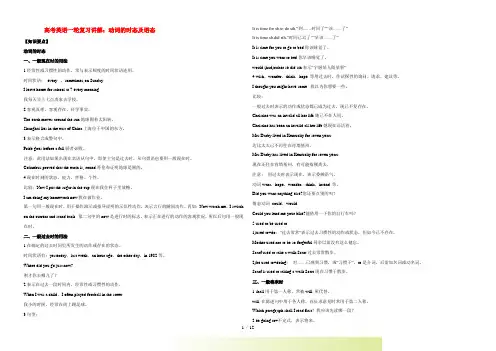
高考英语一轮复习讲解:动词的时态及语态【知识要点】动词的时态一、一般现在时的用法1.经常性或习惯性的动作,常与表示频度的时间状语连用。
时间状语:every...,sometimes,on SundayI leave home for school at 7 every morning.我每天早上七点离家去学校。
2.客观真理,客观存在,科学事实。
The earth moves around the sun.地球围着太阳转。
Shanghai lies in the east of China.上海位于中国的东方。
3.表示格言或警句中。
Pride goes before a fall.骄者必败。
注意:此用法如果出现在宾语从句中,即使主句是过去时,从句谓语也要用一般现在时。
Columbus proved that the earth is round.哥伦布证明地球是圆的。
4.现在时刻的状态、能力、性格、个性。
比较:Now I put the sugar in the cup.现在我往杯子里放糖。
I am doing my homework now.我在做作业。
第一句用一般现在时,用于操作演示或指导说明的示范性动作,表示言行的瞬间动作。
再如:Now watch me,I switch on the current and stand back. 第二句中的now是进行时的标志,表示正在进行的动作的客观状况,所以后句用一般现在时。
二、一般过去时的用法1.在确定的过去时间里所发生的动作或存在的状态。
时间状语有:yesterday,last week,an hour ago,the other day,in 1982等。
Where did you go just now?刚才你去哪儿了?2.表示在过去一段时间内,经常性或习惯性的动作。
When I was a child,I often played football in the street.我小的时候,经常在街上踢足球。
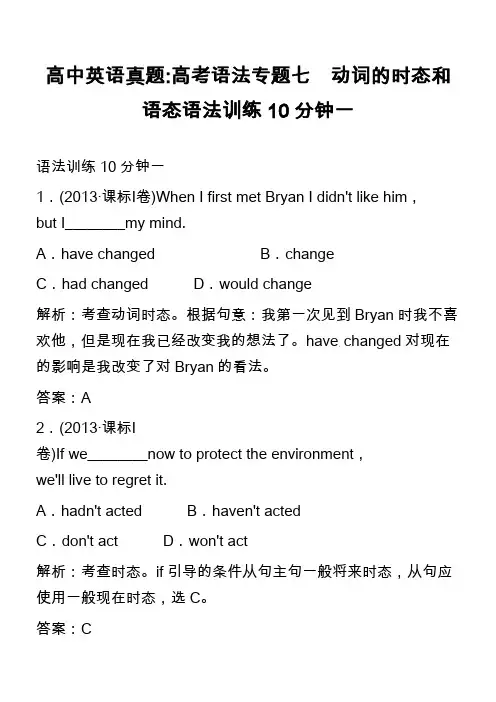
高中英语真题:高考语法专题七动词的时态和语态语法训练10分钟一语法训练10分钟一1.(2013·课标Ⅰ卷)When I first met Bryan I didn't like him,but I________my mind.A.have changed B.changeC.had changed D.would change解析:考查动词时态。
根据句意:我第一次见到Bryan时我不喜欢他,但是现在我已经改变我的想法了。
have changed对现在的影响是我改变了对Bryan的看法。
答案:A2.(2013·课标Ⅰ卷)If we________now to protect the environment,we'll live to regret it.A.hadn't acted B.haven't actedC.don't act D.won't act解析:考查时态。
if引导的条件从句主句一般将来时态,从句应使用一般现在时态,选C。
答案:C3.(2013·课标Ⅱ卷)We________very early so we packed the night before. A.leave B.had leftC.were leaving D.have left解析:考查动词时态。
根据“我们前一天晚上就打好包了”,可知,“我们会很早离开”,本句用过去进行时表过去将来的动作。
选C。
答案:C4.(2013·北京卷)—Do you think Mom and Dad________late?—No.Swiss Air is usually on time.A.were B.will beC.would be D.have been解析:考查时态。
答语中提到瑞士航空公司的航班通常会准时到达,再从答语中的时态可知,问话人表示的是对未来情况的担忧,所以问句中的宾语从句用一般将来时。
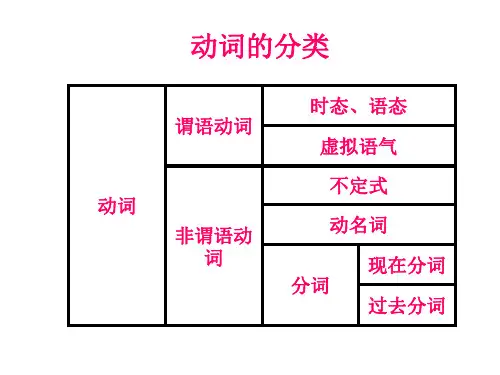
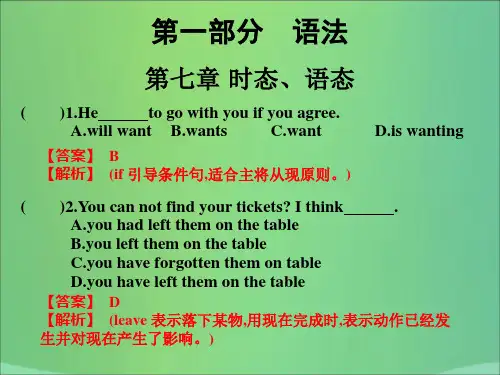
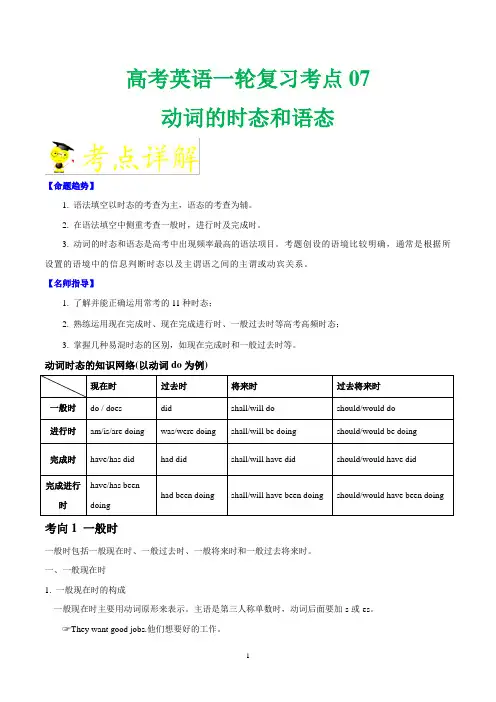
高考英语一轮复习考点07动词的时态和语态【命题趋势】1. 语法填空以时态的考查为主,语态的考查为辅。
2. 在语法填空中侧重考查一般时,进行时及完成时。
3. 动词的时态和语态是高考中出现频率最高的语法项目。
考题创设的语境比较明确,通常是根据所设置的语境中的信息判断时态以及主谓语之间的主谓或动宾关系。
【名师指导】1. 了解并能正确运用常考的11种时态;2. 熟练运用现在完成时、现在完成进行时、一般过去时等高考高频时态;3. 掌握几种易混时态的区别,如现在完成时和一般过去时等。
动词时态的知识网络(以动词do为例)现在时过去时将来时过去将来时一般时do / does did shall/will do should/would do进行时am/is/are doing was/were doing shall/will be doing should/would be doing完成时have/has did had did shall/will have did should/would have did完成进行时have/has beendoinghad been doing shall/will have been doing should/would have been doing考向1 一般时一般时包括一般现在时、一般过去时、一般将来时和一般过去将来时。
一、一般现在时1. 一般现在时的构成一般现在时主要用动词原形来表示。
主语是第三人称单数时,动词后面要加-s或-es。
☞They want good jobs.他们想要好的工作。
☞The coat matches the dress.外衣和裙子很相配。
☞This work does not satisfy me.这项工作我不满意。
☞Do you understand?你懂了吗?2. 一般现在时的用法①一般现在时的基本用法a. 表示现在习惯性的动作或存在状态☞He always takes a walk after supper.晚饭后他总是散散步。
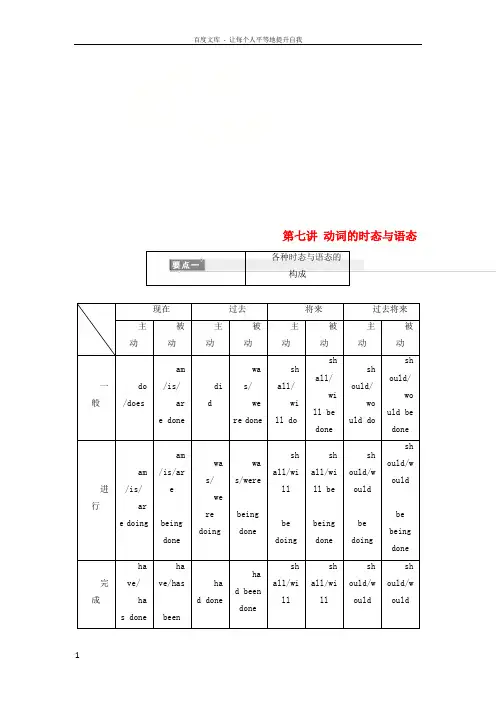
第七讲动词的时态与语态各种时态与语态的构成现在过去将来过去将来主动被动主动被动主动被动主动被动一般do/doesam/is/are donedidwas/were doneshall/will doshall/will bedoneshould/would doshould/would bedone进行am/is/are doingam/is/arebeingdonewas/weredoingwas/werebeingdoneshall/willbedoingshall/will bebeingdoneshould/wouldbedoingshould/wouldbebeingdone完成have/has donehave/hasbeenhad donehad beendoneshall/willshall/willshould/wouldshould/woulddone havedone havebeendonehavedonehavebeendone完成进行have/hasbeendoing—had beendoing—shall/willhavebeendoing—should/wouldhavebeendoing—各种时态的用法1.一般现在时(1)表示客观事实或普遍真理(不受时态限制)。
Time and tide wait for no man.岁月不等人。
(2)表示现状、性质、状态时多用系动词或状态动词;表示经常或习惯性的动作,多用动作动词,且常与表频率的时间状语连用。
Ice feels cold.冰摸上去是冷的。
They always care for each other and help each other.他们总是互相关心、互相帮助。
(3)表示知觉、态度、感情、某种抽象的关系或概念的词(短语)常用一般现在时,如see, hear, smell, taste, feel, notice, agree, believe, like, hate, want, think, belong to, seem等。

专题七动词时态和语态动词的时态和语态是历年高考英语测试的重中之重,一般占1—2道题。
命题思路有三:一是直接给出标志性时间状语,考生能依据所给时间状语作出选择;二是给出时间状语,但所给时间状语有着较强的干扰性,考生不能直接根据时间状语作出选择,需要结合语境判断;三是没有任何时间状语,需要借助于上下文语境,才能作出正确判断。
考生应熟知常用时态和被动语态的构成及用法。
高考题往往不会涉及单一的时态语态,而是更多地侧重于时态的交叉使用和呼应及与语态的结合使用。
所以解题时一定要结合语境,弄清时间的先后关系,可根据不同情况采取“找标法”(寻找时间标志词)、“呼应法”(主从句时态呼应)、“搭配法”(固定搭配)、“语境法”等解题技巧。
一、识别标志词如果题干中有标志性的时间状语,则往往可以根据时间状语选择相应的时态。[例]①More than a dozen students in that school ________ abroad to study medicine last year.A. sentB. were sentC. had sentD. had been sent[解析] 此题有明显的时间标志词last year,提示我们应该使用一般过去时;句中的主语students是被送的对象,应该使用被动语态。答案为B。动词的时态一般都有其相应的时间状语,请同学们熟记下列8种常用时态所对应的时间状语。(1)一般现在时:often, always, usually, seldom, now, every day等。(2)一般过去时:then, yesterday, last week, after that, ago, in the following/next few months等。(3)现在进行时:now, right now, at present, at this moment, these days等。(4)过去进行时:then, at that time, at this time yesterday等。(5)现在完成时: recently, lately, up to/till now, so far, in the past/last few months/years…, for+一段时间, since + 一点时间等。(6)过去完成时:before, by the end of last month/years…等。(7)一般将来时:tomorrow, today, next week/month…, in an hour, in the coming/following few weeks等。(8)过去将来时:the following month, the next week等。[命题角度及对策]高考测试动词时态须与句中时间状语一致时,常在题干中加入具体情景,以测试考生对动词时态知识的实际运用能力。敏锐捕捉时间标志词,并结合具体的语境,选择出正确的动词时态,是解决此类问题的良策。二、主从时态须呼应如果所给题干是主从复合句,可根据主从句时态呼应的原则选出正确的时态。命题角度及对策]近年来高考考查主从句的时态呼应时,常放在真实的并且符合实际的语境中进行考查。在根据时态呼应原则解题时,要把握好以下几点:(1)在时间、条件等状语从句中,用一般现在时表示一般将来时,一般过去时表示过去将来时,用现在完成时表示将来完成时。(2)正确认定主句动词及从句动词两个动作发生的时间,并认真体会命题者所给出的语境。(3)解答宾语从句与主句时态呼应题时,考生应熟知以下规则:主句动词为现在时,则从句动词可根据需要使用任何时态;主句动词为过去时,则从句动词须用恰当的过去的某种时态(表示客观真理时使用一般现在时)。三、仔细体会语境近年来高考试题对时态语态考查的要求越来越高,大部分试题趋向情境化、实际化。因此,仔细体会所给语境,根据具体语境选择合适的时态是考生需要重点解决的问题。例:—Do you think we should accept that offer?—Yes,we should,for we______ such bad luck up till now,and time______ out.A. have had;is runningB. had;is runningC. have;has been runD. have had;has been run【答案解析】 A。
由时间标志词up till now知道,动作是从过去延续到现在,所以第一空要用现在完成时;而根据语境可知时间快要耗光了,所以第二空要用进行时表将来。
—Can you tell me the timetable of the__________school bus?—Well, the bus__________here for the __________campus at 7:00 A.m..A.will leave B.leftC.is leaving D.leaves【答案解析】 D。
考查时态,“校班车的时间表”是规定好的事情,表示一般性动作用一般现在时。
【精选试题】名校模拟题及其答案1. —What’s that terrible noise ?—The neighbors _____ for a party.A. have preparedB. are preparingC. prepareD. will prepare2. Now that she is out of a job, Lucy _____ going back to scho ol, but she hasn’t decided yet.A. had consideredB. has been consideringC. has been completedD. is going to consider3. The mayor of Beijing says that all construction work for the Beijing Olympics _____ by 2006.A. has been completedB. has completedC. will have been completedD. will have completed4. Selecting a mobile phone for personal use is no easy task because technology ____ so rapidly.A. is changingB. has changedC. will have changedD. will change5. I _____ Ping –pong quite well, but I haven’t had time to play since the new year.A. playedB. will playC. have playedD. play6. Visitors ______ not to touch the exhibits.A. will requestB. requestC. are requestingD. are requested7. John and I _____ friends for eight years. We first got to know each other at a Christmas party. But we _____ each other a couple of times before that.A. had been; have seenB. have been; have seenC. had been; had seenD. have been; had seen8. This is Ted’s photo. We miss him a lot. He ______ trying to save a child in the earthquake.A. killedB. is killedC. was killedD. was killing9. —How are the team playing ?—They are playing well, but one of them _____ hurt.A. gotB. getsC. areD. were10. —You haven’t said a word about my new coua, Brenda. Do you like it ?—I’m sorry, I _____ anything about it sooner. I certainly think it’s pretty on you.A. wasn’t sayingB. don’t sayC. won’t sayD. didn’t say11. I wonder why Jenny ____ us recently. We should have heard from her by now.A. hasn’t writtenB. doesn’t writeC. won’t writeD. hadn’t written12. My uncle ______ until he was forty –five.A. marriedB. didn’t marryC. was not marryingD. would marry13. —When will you come to se e me, Dad ?—I will go to see you when you _____ the training course.A. will have finishedB. will finishC. are finishingD. finish14. —How long _____ at this job ?—Since 1990A. we re you cmployedB. have you been employedC. had you been employedD. will you be employed15. With the rapid growth of population, the city _____ in all directions in the past five years.A. spreadsB. has spreadC. spreadD. had spread16. The silence of the library _____ only by the sound of pages being turned over.A. has been brokenB. breaksC. brokeD. was broken17. All morning as she waited for the medical report from the doctor, her nervousness _____.A. has grownB. is growingC. grewD. had grown18. Why don’t you put the meat in the fridge ? It will _____ fresh for several days.A. be stayedB. stayC. be stayingD. have stayed19. —Sorry, Joe, I didn’t mean to—Don’t call me “Joe”. I’m Mr Parker to you, and _____ you forget it !A. doB. didn’tC. didD. don’t20. At this time tomorrow _____ over the Atlantic.A. we’re going to flyB. we’ll be flyingC. we’ll flyD. we’re to fly21. The news came as no surprise to me. I _____ for some time that the factory was going to shut down.A. had knownB. knewC. have knownD. know22. I thought Jim would say something about his school report, but he ______ it.A. doesn’t mentionB. hadn’t mentionedC. didn’t mentionD. hasn’t mentioned23. No one in the department but Tom and I _____ that the director is going to resign.A. knowsB. knowC. have knownD. am to know24. Although he has lived with us for years, he ______ us much impression.A. hadn’t leftB. didn’t leaveC. doesn’t leaveD. hasn’t left25. how can you possibly miss the news ? It _____ on TV all day long.A. has bee nB. bad beenC. wasD. will be26. —Sorry to have interrupted you. Please go on.—Where was I ?—You _____ you didn’t like your father’s job.A. had saidB. saidC. were sayingD. had been saying27. I arrived late; I _____ the road to be so iey.A. wouldn’t expectB. haven’t expectedC. hadn’t expectedD. wasn’t expecting28. I ______ while reading the English textbook. Luckily, my roommate woke me up in time !A. had fallen asleepB. have fallen asleepC. fell asleepD. fall asleep29. Let’s keep to the point or we ______ any decisions.A. will never reachB. have never reachedC. never reachD. never reached30. My mind wasn’t on what he was saying, so I’m afraid I _____ half of it.A. was missingB. had missedC. will missD. missed答案与解析1、B 根据题意先排除D 项,因为回答方要说明书现在的情况;A项have prepare 说明已经准备好,C项prepare是目前的习惯性动作,B项瑞在进行时表示动作的示完性。